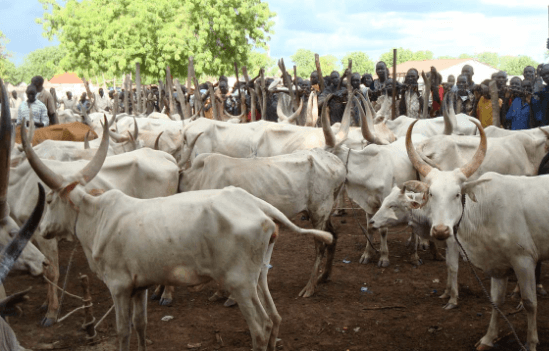Current Prices of Cows in Nigeria

Current Prices of Cows in Nigeria
Nigeria’s culture, economy, and everyday existence revolve around cows. We utilize them as status symbols on important occasions and for meat, milk, and skins. The costs aren’t fixed, despite their importance.
The cost of buying a cow in Nigeria varies depending on its size and kind. Nonetheless, the cost and price of cattle in Nigeria have generally increased from their former levels. Problems like the insurgency in Northern Nigeria, hostility toward Nigerian herders, and livestock rustling in some regions of the nation are to blame for this.
It’s also important to remember that Christmas and salah/Ileya festivals, among other occasions, affect cow prices in Nigeria. Throughout this season, prices are always on the higher side because of increased demand. However, below are the current prices of Cows in every Nigerian market.
| Small-sized cow (calf) | N85,000 – N120,000 |
| Medium-size cow (150kg – 200kg) | N150,000 – N250,000 |
| Big-size cow (220kg – 250kg) | N250,000 – N300,000 |
| Very large cow (300kg – 350kg) | N350,000 – N500,000 |
| Giant-sized cow (400kg – 550kg) | N500,000 – N800,000 |
If you’re considering purchasing cows to commemorate funerals, naming ceremonies, structures, and other occasions, the type of cow you buy will be different from the type that is normally reared.
Factors to Consider Before Buying a Cow
The following are the factors you need to consider before buying a cow;
1. Purpose:
Why is the cow necessary, first of all? For breeding, for meat, or milk production? You may choose the breed and age of the cow you’ll need by considering its intended use.
2. Breed:
Every breed possesses a unique set of characteristics. Some breeds work well for milk, like the Holstein Friesian, and breeds that work well for meat, like the Angus. Make sure the breed meets your needs by doing your homework.
3. Cow:
The cow’s age is also important. Older cows could be more suited for immediate meat output, but younger cows are typically better for long-term investments.
4. Well-being:
To guarantee output and minimize veterinary expenses, you should have a healthy cow. Examine the animal for smooth coats and clean eyes. If at all feasible, request access to health records.
5. Cost:
You must, of course, take your spending limit into account. A cow’s breed, age, and state of health can all have a big impact on its price. Make and follow a budget.
6. Facilities:
Is there enough room for the cow? Enough food facilities, sleeping, and caring for oneself are necessary.
7. Local Rules:
Verify that you are aware of any local laws or rules about the ownership of animals. You may require certain licenses or permits.
8. Where to Buy:
These days, you may buy cows online, at farms, or even at auctions. Every option has advantages and disadvantages, so decide which best suits your comfort level.
In all, first-time buyers should try as much as they can to consult a veterinarian or a livestock expert before purchasing any type of cow to avoid making regrettable decisions. Also, the cost of feed, medication, and other upkeep necessities should be taken into account before making a purchase. Because it’s not just about buying the cow; it’s also about maintaining it.
Factors Affecting the Prices of Cows in Nigeria
Nigerian cow prices are influenced by the following factors:
1. Location is important: where you are making your purchase matters. Northern Nigeria often has lower cow prices than Southern Nigeria.
2. Breed: A significant factor influencing the price of the cow is its breed. The cost of imported breeds is generally higher.
3. Size & Age: A fully grown cow will cost more than a younger one. Dimensions are also important.
4. Health: A cow that appears well will sell for more money than one that is underweight or unwell.
5. The market conditions are determined by the rules of supply and demand. The costs might skyrocket around holidays like Eid.
Top Cow Markets in Nigeria
If you’re looking to buy cows in Nigeria at the best prices obtainable, then you need to visit any of the biggest cow markets in the country. These include:
Wudil cattle market, Kano State
Scheme Cattle Market, Katsina State
Potiskum cattle market, Yobe State
Maitagari cattle market, Jigawa State
Amansea cattle market in Anambra State
Asaba cattle market, Delta State
Note that there are other big cattle markets all over Nigeria, but the ones listed above are where you can get the cows at the best prices. If you’re not too close to any of the above-listed markets, you can make do with any cow market within your locality.
Here is a detailed summary of cow prices in Nigeria for the year 2024, as of this writing. This post makes it very evident that purchasing a cow involves several factors beyond the purchase price.
I appreciate you taking the time to read this information. As much as we enjoyed learning about it, we hope you did too.
Do you have any queries or observations you’d like to share? Please feel free to leave them in the comments area or contact us personally. Take care, and happy cow buying, till we speak again! Toast!
